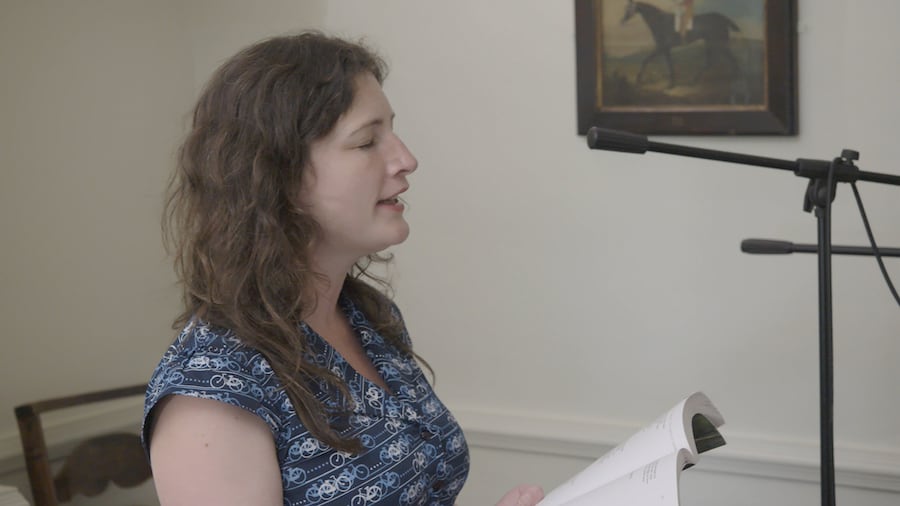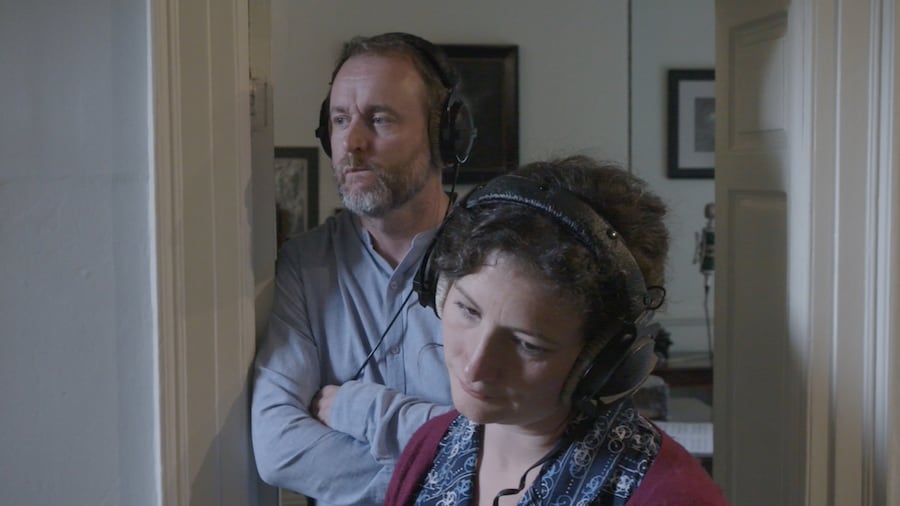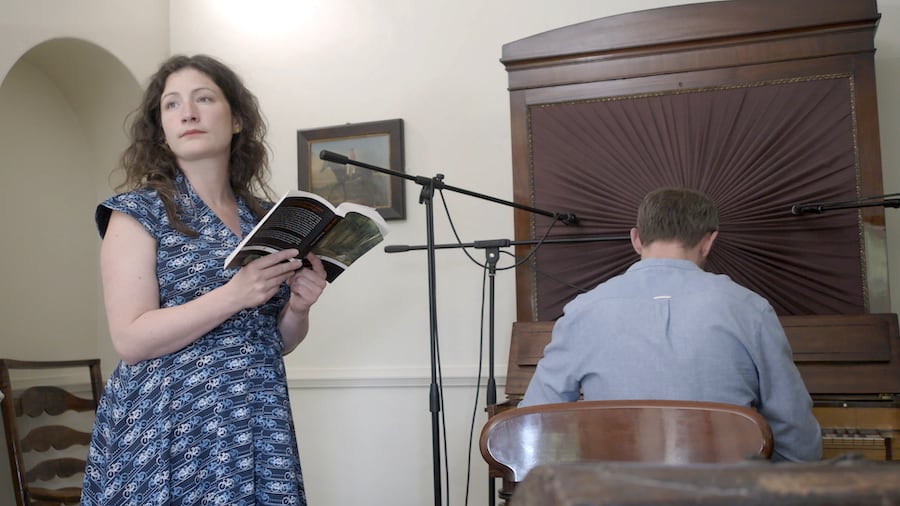Off the back of their recent release ‘Lines’ – a trilogy of song cycles inspired by poetry, focusing on three female perspectives through time – we caught up with Rachel Unthank (of The Unthanks) to discuss her part in bringing this remarkable collection to our attention. She talks us through the history of each commission, as we explore: ‘Part One – Lillian Bilocca’ originally performed live in the site-specific theatre event ‘The Last Testament of Lillian Bilocca’; ‘Part Two – World War One’ songs inspired by the poems and letters of lesser heard female voices of the time and ‘Part Three’, a collection of ten poems by Emily Brontë, tastefully set to song.
Rachel shares her thoughts on Brontë’s wild spirit and poetry, plus her excitement ‘playing house-band’ and working alongside Maxine Peake on the experimental theatrics of the Lillian Bilocca project. She also provides an insight into their current unaccompanied ‘As We Are’ tour which the trio (Rachel, Becky & Niopha) were refining at the time of this interview (that’s when the babies aren’t crashing their band rehearsals!)
You can read our earlier interview with Adrian McNally (their pianist and composer) here.
Listening back to ‘Diversions’ and now ‘Lines’ would you say you are drawn towards underdogs, rebels and those suffering from injustice? There’s a pattern of being attracted to the fiercely passionate, bold and often vulnerable. Is this a natural instinct drawing on people you would like to give more of a voice to?
I think it’s a bit of a natural instinct really; I think your empathy obviously goes out to underdogs and those with more interesting stories, the more complex ones. Those that have different colours that you can draw out with vulnerability and strength, they do make for more interesting stories to tell.
But it is great to be part of the Lillian Bilocca project working alongside Maxine Peake. I didn’t know about that story, so it’s brilliant to be able to tell a story you’ve never heard. Again with Molly Drake, it was exciting to be able to find such a wonderful writer where people hadn’t heard her songs so much. There was such wealth and depth in her writing; it was really great to get your teeth stuck into.
Again, obviously, Emily Brontë is very well known worldwide. But for myself and for us as a band we didn’t know about her poetry, so for ourselves, that was a really nice journey to go on to try and convey the passion and the landscape that is in her writing, and try and make it into music.
You mention the landscape, and your upbringing was informed by your surroundings – growing up so close to the sea, you’ve always sung sea shanties for example. Do you share an affinity with Emily in the sense that a lot of her writing is so elemental?
That is something that we definitely recognised when we started reading her poetry, how elemental it is and how that reminded us of some of the folk songs that we sing and have grown up with, those that really put you in a sense of place. You can really feel the wild moors and it gives a real strong sense of place, which is kind of what we love about it. So there was definitely something that we recognized in her writing, something that we are drawn towards ourselves, and her passion, strength and depth of feeling.
Some of her poems, ‘Remembrance’ for example, really reminded me of those songs like ‘I Am Stretched On Your Grave’, those traditional songs where someone is lying on the grave mourning the loss of a loved one but with real passion. The landscape takes a part of that. It really reminded me of those old folk songs and it was the only song that I actually contributed the tune to. I changed a traditional tune I’d heard because I felt that there was a relationship there. Plus there’s a strong theme, of death and mourning and loss. Again very familiar to the stuff we’ve grown up with so it’s definitely not too intense for us.
It’s not something you shy away from. Going back to ties with place, Adrian recorded this on Emily’s restored piano and spent time in the Parsonage separately. He said that he slept in the room that supposedly inspired Brontë’s famous window scene in Wuthering Heights. Do you feel these factors would have fed into the music as well?
Yeah I think actually being there, y’know it’s a very particular type of atmosphere and the Parsonage looks out onto the graveyard and then quite quickly you can get up out onto the moors and into the wild. For us, that felt really powerful and I can’t imagine what it must have been like for them to live there then because it would’ve been much more of an industrial town, but then to have access to this wild landscape with amazing views! I think landscape does permeate and feed into music and definitely art, music and writing, and your surroundings can’t help but shape you a little bit.
Can we talk more about your feelings regarding being a channel for oppressed female voices in regards to the Lillian Bilocca songset and the WW1 poetry?
Well, I think again naturally as storytellers and singers we’re drawn to those from a women’s perspective obviously as women ourselves. Not that we don’t sing songs from a male perspective, we do. But there’s something about being able to tell a story from a women’s perspective, you can get in the character, and you have empathy.
Obviously we’re still keen to tell women’s stories as well. So I think this Theresa Hooley poem called ‘War Film’, just her words are so powerful. It’s about watching a war film and then seeing the news in the cinema. Then going home bathing her baby and reflecting upon what she’s seen and what that actually means. I think her words are so striking, true and powerful. They speak a truth about all wars, and all mothers and parents. That’s something we felt we wanted to sing, it’s still so relevant.
For the Brontë set it was just yourself, Becky and Adrian but for the First World War and Lillian song cycles you were working with a much larger ensemble. How did your approach to those two commissions differ?
Well, it was a project really that Sam Lee had already been involved in and then we came in a little bit later, so there were already some of the musicians he had been working with. Then we brought some of our own musicians, collaborated and we tried to find a way through together. So these are just some of the songs we worked on the time.
Yes obviously the Emily Brontë set is just very stripped back – it’s simply Me, Adrian and Becky singing with piano – which is a way that we always kind of start with anyway. But obviously ourselves we work with a ten-piece band quite often and we love to explore different colours that strings and brass can bring in. So for the WW1 project, it kind of felt right to bring in those things.
Then for the Lillian Bilocca project we were actually in the play, we were the house band! It was a promenade piece that was in a big old building in Hull and it moved through different spaces. At one point we were a sixties pub band and then we were at a function, so that was with our drummer Martin and our guitarist Chris, and Niopha on fiddle, as well as us three. That was a completely different experience because we had to look like a Sixties band – so we had y’know, beehives! So that was a really great experience to be in one place for more than one night, for the whole run and also to not talk to the audience, be part of the show. I really enjoyed being a part of that and seeing the action and the actors every night.
I suppose now when we play the songs at first I didn’t really know what to do, “Oh I can look at people now?” but also I got all these images in my head of what was going on. Like in ‘Whistling Woman’ there was a great big silver codfish that was brought in and then torn apart by the women and they pulled money out, throwing it to the audience. Then they stood on the tables with their arms out whilst the men tried to pull them off. So there’s all this very dramatic action going on in my head now – I feel like I want to show that but I can’t really express that through my eyes and my voice to the audience.
I suppose with the WW1 set the action was often happening behind you, projected or on film. For this you were an active part of the cast, plus there was a community cast as well, it sounds incredible to be a part of…
Yes there was! I mean it was a great experience. I studied theatre at university as well partly and I never thought I’d be in a play because I didn’t do acting I just studied theatre. So it was really fascinating to be on the inside and see how things work. It was lovely to make friends with the community cast and see how all the different elements came together to pull off this show every night.
I wish I could’ve seen it. How was it working with Maxine Peake and director Sarah Frankcom as well?
Oh it was really great. Maxine’s just so humble and easy to talk to, and lovely, funny and we all got on really well. It was interesting to see Sarah directing and the way she brought the whole piece together. It was a dream come true really for me.
It was also so well received by the people of Hull…
I think there was something about inhabiting a working building as well, that in the daytime there was people in the offices and then at night time it became this different place and I think it was very powerful to not use a traditional theatre but to use a space. It was a really beautiful piece. Even Adrian got to help program the bells to play this shanty we sang at the end; as people were going out the bells were playing the tune.
It sounds incredibly immersive – Adrian spoke about people witnessing it from different angles?
Well, it moved all the time so they would come up the stairs and then they would walk past a room where something was happening, then they’d go into a room with a meeting, then they’d go into another room where it was almost like in the round. At one point they had to put headphones on and listen to a woman as she was acting in her kitchen. Then they would come into what was like a pub and we’d be playing, they’d just be stood watching what was going on. Then they ended up in a ballroom where it was the Silver Cod Ball, where they used to have this prize to give to the trawler who had caught the most cod that year. So the audience sat round tables as if they were at the function. So lots of different experiences in one evening I suppose.
You mentioned you studied theatre and there’s this through-line of poetry throughout the song cycles – have theatre and poetry always resonated with you deeply?
I suppose it’s just the same thing really. Becky and I have always been drawn to storytelling in their different forms. So when we were little we used to go to lots of folk festivals and we saw proper storytellers like Taffy Thomas and lots of Scottish & Irish storytellers at places like Whitby Folk Festival and that had a really big influence. Then you know going to the local folk club and festivals, hearing singers and being drawn to them. When I was younger I remember being drawn into that world hearing adults singing stories to each other and also realizing it wasn’t necessarily about the quality or the technicality of your voice, it was about the people that drew you in – those were the really great storytellers.
I really love reading as well. I love to go to the theatre and of course, I love music as well. It’s all different ways of telling stories and having empathy with people and learning things. So all those different art forms for me have that root at the heart. ‘Art’ even is just a person trying to communicate in different ways and I find that just fascinating.
So you’re about to go on tour now? There’s going to be older material but we can also expect some new songs as well?
Yes, so it’s just me, Becky and Niopha singing together unaccompanied. So obviously that’s how Becky and me started singing, just together with our voices. Quickly once we met Niopha we started to add in an extra harmony and whenever we go out on tour we always do something together just the three of us. We really enjoy just using our voices and harmonizing. So we thought we would do a tour at some point and because we’ve just done a big orchestral thing recently, we’ve just kind of gone back to basics and thought this was the time to do it.
We are also working on a lot of new material as well. Some songs that we’ve performed live but we’ve never recorded. Some things we’d perform on tour but had never necessarily released. It’s a bit of a mix. We’re still working it out at the moment. But it’s a lot of fun. Its nerve wracking as well you know because we just have to keep singing there’s no trumpet solo for us to have a little rest. There’s a lot to learn! But it’s exciting, there are lots of songs we’ve always meant to do and we’re having new ideas. As well as challenging ourselves to find new ways to convey new stories vocally. Plus Becky and Niopha have both had babies recently as well, so there’s quite a lot of small people coming and going in our rehearsals. They’ll be coming on tour as well!
The Emily Brontë Song Cycle Tour
OCTOBER 2019
16 GATESHEAD The Sage Gateshead (18.30 / 21.00)
17 LINCOLN Drill Hall
19 MANCHESTER Home (Manchester Folk Festival)
20 EDINBURGH The Queens Hall
21 BRIGHTON Dome
23 YORK National Centre for Early Music
24 BRADFORD St George’s Hall
25 OXFORD North Wall Arts Centre
26 SAFFRON WALDEN Saffron Hall (on sale 22nd May)
27 HULL Middleton Hall
28 NEWCASTLE UNDER LYME New Vic Theatre
29 LONDON Hackney Round Chapel
30 LONDON Shoreditch Town Hall
31 WORCESTER Huntingdon Hall
NOVEMBER 2019
01 SHEFFIELD Crucible (on sale June)
03 DUBLIN National Concert Hall
04 CORK Opera House
Special Guests – The Bookshop Band (except Gateshead and Manchester).
Ticket links and details of their current tour can be found here: http://www.the-unthanks.com/tour-dates/




